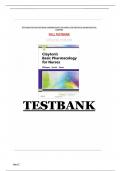Med C
,Chapter 1: Drug Definitions, Standards, and Information Sources
Test Bank
MULTIPLE CHOICE
1. What is the name under which a drug is listed by the U.S. Food and Drug Administration
(FDA)?
a. Brand
b. Nonproprietary
c. Official
d. Trademark
ANS: C
The official name is the name under which a drug is listed by the FDA. The brand name, or
trademark, is the name given to a drug by its manufacturer. The nonproprietary, or generic,
name is provided by the U.S. Adopted Names Council.
DIF: Cognitive Level: Knowledge REF: p. 1 OBJ: 2
TOP: Nursing Process Step: Assessment
MSC: NCLEX Client Needs Category: Safe, Effective Care Environment
2. Which source contains information specific to nutritional supplements?
a. USP Dictionary of USAN & International Drug Names
b. Natural Medicines Comprehensive Database
c. United States Pharmacopoeia/National Formulary (USP NF)
d. Drug Interaction Facts
ANS: C
United States Pharmacopoeia/National Formulary contains information specific to
nutritional supplements. USP Dictionary of USAN & International Drug Names is a
compilation of drug names, pronunciation guide, and possible future FDA approved drugs;
it does not include nutritional supplements. Natural Medicines Comprehensive Database
contains evidence based information on herbal medicines and herbal combination products;
it does not include information specific to nutritional supplements. Drug Interaction Facts
contains comprehensive information on drug interaction facts; it does not include
nutritional supplements.
, DIF: Cognitive Level: Knowledge REF: p. 2 OBJ: 4
TOP: Nursing Process Step: Assessment
MSC: NCLEX Client Needs Category: Physiological Integrity
3. What is the most comprehensive reference available to research a drug interaction?
a. Drug Facts and Comparisons
b. Drug Interaction Facts
c. Handbook on Injectable Drugs
d. Martindale—The Complete Drug Reference
ANS: BFirst published in 1983, Drug Interaction Facts is the most comprehensive book
available on drug interactions. In addition to monographs listing various aspects of drug
interactions, this information is reviewed and updated by an internationally renowned group
of physicians and pharmacists with clinical and scientific expertise. DIF: Cognitive Level:
Comprehension REF: p. 3 OBJ: 3TOP: Nursing Process Step: AssessmentMSC: NCLEX
Client Needs Category: Physiological Integrity
4. The physician has written an order for a drug with which the nurse is unfamiliar. Which
section of the Physicians’ Desk Reference (PDR) is most helpful to get information about
this drug?
a. Manufacturer’s section
b. Brand and Generic Name section
c. Product Category section
d. Product Information section
ANS: B
A physician’s order would include the brand and/or generic name of the drug. The
alphabetic index in the PDR would make this section the most user friendly. Based on a
physician’s order, manufacturer’s information and classification information would not be
known. The Manufacturer’s section is a roster of manufacturers. The Product Category
section lists products subdivided by therapeutic classes, such as analgesics, laxatives,
Med C
, oxytocics, and antibiotics. The Product Information section contains reprints of the package
inserts for the major products of manufacturers.
DIF: Cognitive Level: Comprehension REF: p. 3 OBJ: 4
TOP: Nursing Process Step: Planning
MSC: NCLEX Client Needs Category: Physiological Integrity
5. Which online drug reference makes available to health care providers and the public a
standard, comprehensive, up to date look up and downloadable resource about medicines?
a. American Drug Index
b. American Hospital Formulary
c. DailyMed
d. Physicians’ Desk Reference (PDR)
ANS: C
DailyMed makes available to health care providers and the public a standard,
comprehensive, up to date look up and downloadable resource about medicines. The
American Drug Index is not appropriate for patient use. The American Hospital Formulary
is not appropriate for patient use. The PDR is not appropriate for patient use.
DIF: Cognitive Level: Knowledge REF: p. 4 OBJ: 5
TOP: Nursing Process Step: Implementation
MSC: NCLEX Client Needs Category: Physiological Integrity
6. Which legislation authorizes the FDA to determine the safety of a drug before its
marketing?
a. Federal Food, Drug, and Cosmetic Act (1938)
b. Durham Humphrey Amendment (1952)
c. Controlled Substances Act (1970)
Downloaded by: samueloronaso | samuelorona.so@gmail.com
d. Kefauver Harris Drug Amendment (1962)
ANS: A




